|
|
|
Sort Order |
|
|
|
Items / Page
|
|
|
|
|
|
|
| Srl | Item |
| 1 |
ID:
166018


|
|
|
|
|
| Summary/Abstract |
This article analyzes the way in which American politicians and experts debate the problem of denuclearizing the Korean Peninsula, is analyzed from the viewpoint of how likely it is that a consensus can be reached in the domestic politics of the United States. The views of the most influential groups of the American establishment in the Democratic and Republican parties are examined in the context of current events in the region. The authors conclude that since these views largely coincide with the denuclearization policy of President Donald Trump, the administration and Congress will reach a full consensus on this issue.
|
|
|
|
|
|
|
|
|
|
|
|
|
|
|
|
| 2 |
ID:
153484


|
|
|
|
|
| Summary/Abstract |
Wide-ranging discussions have only recently begun concerning the turn towards conservative values in Europe. In fact, one of the first signs of this change was the general election in the Netherlands in 2010, when the ultra-right People's Party for Freedom and Democracy won 24 seats in the Dutch parliament to become the third largest political force in the country. The right-wing trend gained momentum from 2014-2016: any vote in European countries added influence to forces whose rhetoric focused on strengthening the nation state, criticizing integration processes, and complaining about the globalization of all aspects of life.
|
|
|
|
|
|
|
|
|
|
|
|
|
|
|
|
| 3 |
ID:
103543
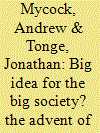

|
|
|
|
|
| Publication |
2011.
|
| Summary/Abstract |
The proposed introduction of National Citizen Service (NCS) by the Conservative party survived the negotiations with the Liberal Democrats and forms part of the coalition's policy agenda. The idea forms part of the concern of Cameronian Conservatives to create a big society, based primarily upon volunteering and civil engagement. Drawing upon comparisons with state and private sector-led models of citizen volunteering in Germany and the United States, this article explores the evolving rationale for the introduction of NCS and evaluates the issues and pitfalls which may arise.
|
|
|
|
|
|
|
|
|
|
|
|
|
|
|
|
| 4 |
ID:
102748
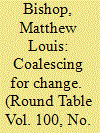

|
|
|
|
|
| Publication |
2011.
|
| Summary/Abstract |
In May 2010 two elections took place in traditional 'Westminster' polities-the United Kingdom and Trinidad and Tobago-in which coalition governments took power. In both countries, a significant part of the discourse in the run-up to election focused on the inequities of the Westminster model, and, in particular, first-past-the-post. Yet, interestingly, the end result in many ways mirrors the kind of outcome often championed by supporters of more proportional electoral systems. This article compares and contrasts the two different elections, and asks whether such coalitions are set to become a regular feature of a more mature Westminster model.
|
|
|
|
|
|
|
|
|
|
|
|
|
|
|
|
| 5 |
ID:
092365
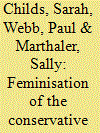

|
|
|
|
|
| Publication |
2009.
|
| Summary/Abstract |
Under David Cameron's leadership reforms have been made to the Conservative party's parliamentary selection procedures and distinct women's policy initiatives have been developed. This article, based on focus group data with party members, explores attitudes towards measures designed to recruit more women Conservative MPs. Broadly, we find that, despite widespread support for the principle of greater social diversity among PPCs, members are uncomfortable with the specific measures that have been introduced. This is largely on the grounds that anything approaching 'positive discrimination' should be eschewed in favour of the 'meritocratic' selection of candidates. Further, the members tend to resent central party 'interference' in what has traditionally been the domain of local Constituency Associations.
|
|
|
|
|
|
|
|
|
|
|
|
|
|
|
|
| 6 |
ID:
096258
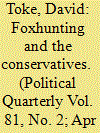

|
|
|
|
|
| Publication |
2010.
|
| Summary/Abstract |
The Conservatives are pledged to have a free vote in Parliament on legislation in Government time to reverse the 2004 Hunting Act. This Act bans hunting with dogs. The Countryside Alliance has opposed the Hunting Act as part of campaigns to defend its notion of rural interests. The Countryside Alliance's success in gaining the Tory pledge could be underscored by a Tory hope that hunting supporters give decisive support for Tory candidates in marginal Parliamentary constituencies. However, the Tory leadership may find it politically difficult to give early priority to legislative attempts to repeal the Hunting Act. Moreover, it is likely to require a large Tory majority and years of waiting before a Tory government is able and willing to complete a repeal of the hunting ban.
|
|
|
|
|
|
|
|
|
|
|
|
|
|
|
|
| 7 |
ID:
092372
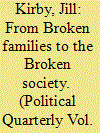

|
|
|
|
|
| Publication |
2009.
|
| Summary/Abstract |
This article traces the development of the Conservative party's 'broken society' narrative, from its roots in William Hague's early invocations of 'social justice' to the evidence-based approach adopted by David Cameron. It considers relevant social trends over the period since 1970; summarises the Conservative party's attitude to family policy in government between 1979 and 1997; and shows how the Conservatives in opposition from 1997 onwards have become more focused on support for the marriage-based family, now a central tenet of Conservative social policy under David Cameron's leadership.
|
|
|
|
|
|
|
|
|
|
|
|
|
|
|
|
| 8 |
ID:
138278


|
|
|
|
|
| Summary/Abstract |
The Coalition took office in 2010 in what seemed to be a relatively benign foreign policy environment. Since then, the international environment has become far more treacherous and the government has considered war on humanitarian grounds on three occasions. In light of the silence of early Coalition documents on humanitarian intervention, together with the two parties’ different positions on the issue, this article assesses the extent to which the Coalition has adopted a distinctive approach to humanitarian intervention. In so doing, it evaluates the relative importance of Conservative and Liberal Democrat traditions in determining the direction of Coalition foreign policy. The article also considers whether there are other, more pertinent factors driving foreign policy, and offers an explanation for its relative isolation from coalition tensions. It concludes by reflecting on the likely future of humanitarian intervention after the May 2015 general election.
|
|
|
|
|
|
|
|
|
|
|
|
|
|
|
|
| 9 |
ID:
086399
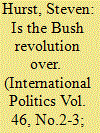

|
|
|
|
|
| Publication |
2009.
|
| Summary/Abstract |
Several observers have argued that the radical transformation of American foreign policy wrought by George W. Bush is already over. They argue that the 'Bush Revolution' was merely a result of the short-term conjuncture of neoconservative influence and the impact of September 11, 2001, and that this temporary deviation has been ended by the American failure in Iraq. Yet the causes of the Bush Revolution are more fundamental and long-term than this argument implies. It is in the combination of the shift to a militarily unipolar international system and the dominance of the Republican Party by its conservative wing that the real roots of the Bush foreign policy lie, and neither condition is likely to alter in the foreseeable future. Moreover, although the Iraq War has led to some shifts in policy, the Republicans' selection of John McCain as their presidential candidate confirms the continued vitality of the Bush Revolution.
|
|
|
|
|
|
|
|
|
|
|
|
|
|
|
|
| 10 |
ID:
138276
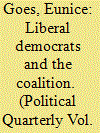

|
|
|
|
|
| Summary/Abstract |
When the Liberal Democrats joined the Coalition government in May 2010, there was an expectation that they would have a restraining effect on the Conservatives, particularly in the area of European politics. But after almost five years as the junior party in the Coalition, the Liberal Democrats struggle to demonstrate their influence over the government's approach to Europe. Not only did they let the Conservatives lead the Coalition's European agenda, but they will be forever associated with the government that brought the UK closer to the exit door of the European Union. The article argues that this outcome is the result of a series of avoidable if surprising mistakes, such as the choice of ministerial portfolios and the party's attitude to the Coalition's monitoring mechanisms, as well as some unavoidable mistakes that could have not been foreseen when the Coalition was formed.
|
|
|
|
|
|
|
|
|
|
|
|
|
|
|
|
| 11 |
ID:
139056


|
|
|
|
|
| Summary/Abstract |
By the time Gordon Brown, Britain’s former Labor prime minister, arrived at the school in Nottingham where he was scheduled to speak, he was an hour late and the audience had dwindled to 130 people. Brown’s message was “Don’t lose hope.” He said Nelson Mandela once told him of a painting called Hope that he had kept on the wall of his prison cell in South Africa. It showed a girl wearing a blindfold, sitting on a globe trying to play a harp with all its strings broken. “[Mandela] was saying, even in a situation that seems hopeless, there is always hope,” Brown told his audience. “The Labor movement was built on hope.”
|
|
|
|
|
|
|
|
|
|
|
|
|
|
|
|
| 12 |
ID:
138272
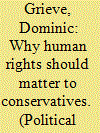

|
|
|
|
|
| Summary/Abstract |
In a speech given to the University of London's Constitution Unit and Judicial Institute on 3 December 2014, the Rt Hon Dominic Grieve QC MP challenged Conservatives to think carefully about the party's proposal to break the link between British courts and the European Court of Human Rights in Strasbourg. Grieve recalled why the United Kingdom signed the Convention in the first place and, although recognising that the Court's approach has been on occasion properly criticised and may present difficulties, argued that the reforms embodied in the Brighton Declaration 2012 are bearing fruit. He provided a critical exposition of the Conservative paper ‘Protecting Human Rights in the UK: the Conservatives’ Proposals for changing Britain's Human Rights Laws’ (October 2014) and concluded that Conservatives should want to remain within the jurisdiction of the ECHR to maintain and ensure the Court's effectiveness and continued viability.
|
|
|
|
|
|
|
|
|
|
|
|
|
|
|
|
|
|
|
|
|